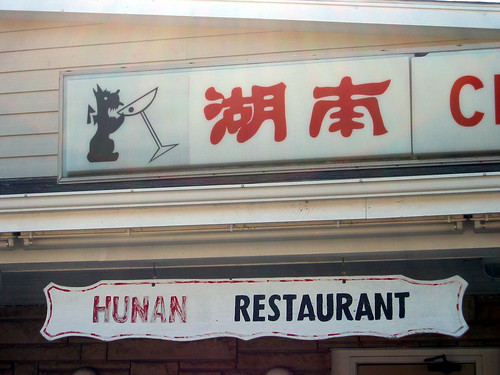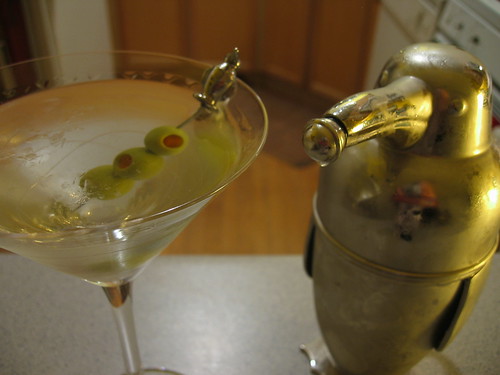
{Photo by rocketlass of our talented nephew happily making a drink he wouldn't be drinking.}
From Auntie Mame: An Irreverent Escapade (1955), by Patrick Dennis:
My advancement that summer of 1929, if not what Every Parent's Magazine would recommend, was remarkable. I learned to make what Mr. Woolcott called a "Lucullan little martini" and I had learned not to be so frightened of Auntie Mame's most astonishing friends.I briefly mentioned Bernard DeVoto's wonderful little treatise, The Hour: A Cocktail Manifesto (1951) last week, but in honor of a quiet Friday night of piano playing and baseball on the radio, it seems right to offer up some more pleasures from its pages.
Here, for example, is DeVoto, with a clarity and ethical certainty rarely seen outside of Jeeves, explaining away some of the many damaging myths that have tendriled 'round the world's greatest drink:
For instance there is a widespread notion that women cannot make martinis, just as some islanders believe that they case an evil spell on the tribal fishnets. This is a vagrant item of male egotism: the art of the martini is not a sex-linked character. Of men and women alike it requires only intelligence and care--oh, perhaps some additional inborn spiritual fineness, some feeling for artistic form which, if it isn't genius, will do quite as well. Or take the superstition, for I cannot dignify it as a heresy, that the martini must not be shaken. Nonsense. This perfect thing is made of gin and vermouth. They are self-reliant liquors, stable, of stout heart; we do not have to treat them as if they were plover's eggs. It does not matter in the least whether you shake a martini or stir it. It does matter if splinters of ice get into the cocktail glass, and I suppose this small seed of fact is what grew into the absurdity that we must not "bruise the gin." The gin will take all you are capable of giving it, and so will the vermouth.Such gentle suasion alternates with a vigorous campaign of naming and shaming, designed to set the wayward back on the path of cocktail righteousness. The third chapter, titled simply "The Enemy," opens starkly:
We can't sit around all afternoon; there is evil to be dealt with.From there, DeVoto proceeds to savage sweet cocktails--the end result of a youth spent downing "soft drinks that would corrode any plumbing except a child's"--and publishers of cookbooks, which can be trusted to have execrable drink sections:
Presumably when the plates are worn out and a new edition [of a cookbook] is called for the publisher hires someone to go over and check the recipes in all sections but one. If he finds some solecism about chervil, out it comes. I dare say, even, that they sometimes actually make and taste the white sauce to see whether someone has pulled a howler. But the section fraudulently labeled "Beverages" has stood unmodified since it was first perpetrated; no one has bothered to so much as correct the typographical errors. Furthermore, it is the same in all cookbooks, having gone out of copyright in 1895. And if the time when it was written was the lush days of four pounds of butter in the pantry, it was also the holy-horror era in our drinking mores. As I have shown, the basic idea was to see how many ingredients you could put into a drink, especially a cocktail, and still survive. Year by year, that mania of our national adolescence killed more Americans than smallpox, the Colt revolver, or the Indians. Yet publishers go on indorsing the same toxins to more than a million women a year.

{Photo by rocketlass of Asta, displaying the intelligence we've come to expect from him.}
Throughout the book, the vitriol runs as freely as the gin. Yet, as with the admonitions and disdain of Jeeves, it is leavened, crucially, by a clear and abiding love. DeVoto can rail against the vulgar drinkers of terrible drinks--lament that "the stimulation they get is not the benevolence of alcohol but systemic poisoning, a rebellion of the stomach against the filth they pour into it"--without tiring the reader because his loathing is clearly the flip side of his deep appreciation. "The proper union of gin and vermouth," he writes, "is a great and sudden glory; it is one of the happiest marriages on earth." When the violet hour brings you the first sip,
The rat stops gnawing in the wood, the dungeon walls withdraw, the weight is lifted. Nerve ends that stuck through your skin like bristles when you blotted the last line or shut the office door behind you have withdrawn into their sheaths. Your pulse steadies and the sun has found your heart. You were wrong about the day, you did well enough, you did well. The day was not bad, the season has not been bad, there is sense and even promise in going on.And with that, I lift a cold, narrow-stemmed glass and return to my book; may your evening hold as much promise.
